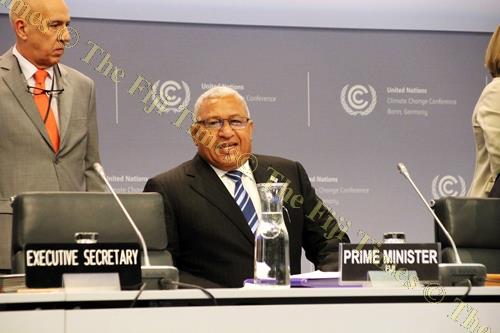THE call by the Prime Minister and COP23 president Voreqe Bainimarama that affluent nations bear a heavy responsibility to ensure that less affluent nations bearing the brunt of the impact of climate change do not suffer unnecessarily is interesting.
Speaking at the opening of a workshop on long-term climate finance in Bonn, Germany, on Monday, he said as a matter of urgency, nations must increase the pool of finance available for mitigation and adaptation and ensure it flowed.
This, he said, included ensuring that conditions exist for private sector investment to flow in a way that allowed rapid transformation of our countries in line with our NDCs (Nationally Determined Contributions).
The PM said there was evidence around us that the threat to the people and economies of vulnerable nations was increasing.
Developed countries, he said, had put forward a roadmap to raise $100 billion of finance a year for climate-related projects in developing nations.
It is a target, he said, that we must achieve by 2020 at the latest.
For that to happen though, he said, developed nations would engage the private sector to develop new and innovative means through which increased and sustained finance could flow into areas of need.
Climate change is a touchy issue. It draws emotional responses that can weigh in on different spectrums of the thought process.
Let’s take President Donald Trump for instance, who, in the lead up to the US elections in 2016 made no bones about what he believed in.
On the campaign trail, his views were quite clear over the issues of energy and climate change.
He is on record labelling climate change science a “hoax”.
He has even suggested it was part of a plot to undermine the US economy.
Mr Trump gave the impression he remains an aggressive critic of climate change.
In the face of that strong stance sits this little tale from the islands of Kadavu.
About 10 villages on Kadavu province were earmarked for relocation because of their vulnerability to climate change. This was revealed by a Ministry of Lands and Mineral Resources representative at the Kadavu Provincial Council meeting in Suva last year.
The cost of relocating a village would depend on the size of the village and what needs to be relocated.
On one end of the divide sits the notion that climate change is a “hoax” as Mr Trump and his supporters insist.
It is the other side of this divide that has a great impact on our people.
Villagers are been forced to relocate. The sea is slowly creeping into their villages. For some of them, waves are splashing right onto homes they have lived in for decades. Their situation is real.
Every day the waves run up the sandy beaches, past coconut trees, over what used to be soft grass, and sometimes straight on to the walls of homes.
Those affected certainly believe something is not right.
Perhaps, we should ask ourselves how involved are we as individuals towards the issue of climate change?
Are we engaged?
Do we monitor our carbon footprint for instance?
If not then perhaps the time is right for us to start somewhere.




